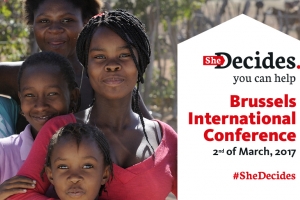Belgium joins new Coalition for Epidemic Preparedness Innovations (CEPI)

Belgium has acceded to the Coalition for Epidemic Preparedness Innovations (CEPI). This is a global alliance which intends to step up the fight against fatal infectious diseases in the coming years. The Belgian Peter Piot, director of the London School of Hygiene & Tropical Medicine, is one of the driving forces behind the initiative. This year, Deputy Prime Minister and Minister for Development Cooperation Alexander De Croo will set aside €500,000 for the new fund.
The Ebola and SARS outbreaks in recent years made it clear that a new international approach in the fight against fatal infectious diseases is necessary. The Ebola outbreak in West Africa alone claimed 11,000 lives and represented an economic loss of more than $2 billion for the countries affected.
In order to limit the spread of pandemics of fatal infectious diseases more quickly in the future, it is vital that new vaccines are made available more quickly. According to a report by the World Health Organisation, too few vaccines are currently being developed. To speed up research and development, the WHO believes that a multilateral, public-private partnership would be the most efficient approach.
As such, at the World Economic Forum in Davos in January, the Coalition for Epidemic Preparedness Innovations (CEPI) was launched by its founding members Norway, Japan, the Wellcome Trust, the Bill & Melinda Gates Foundation, and the World Economic Forum. CEPI has set itself the target of making vaccines for emerging infectious diseases available more quickly, thereby limiting the risk of future pandemics.
The governments of Germany, Japan and Norway, together with the Bill & Melinda Gates Foundation, the Welcome Trust, and important private partners, have provided initial funding of $460 million. The desired target is to raise $1 billion together. Consequently, it will now be possible to develop between four and six vaccines for three priority infectious diseases over the period 2017-2021: the MERS coronavirus (Middle East Respiratory syndrome), Lassa fever (West Africa) and the Nipah virus (Bangladesh).
Belgian support
Deputy Prime Minister and Minister for Development Cooperation Alexander De Croo has decided to support the initiative on behalf of Belgium. As such, €500,000 will be released this year in the form of a direct contribution to the vaccination fund.
Alexander De Croo: "Belgium has a strong track record in terms of combating tropical diseases. This is demonstrated once again by the roles played in the new vaccination fund by pioneering Belgians such as Professor Piot and Dr. Paul Stoffels. Belgian intends to support them in their important work. Fatal epidemics are one of the most significant global threats. This became apparent two years ago during the Ebola epidemic. By investing in the development of new and vital vaccines, we can save thousands of lives".
The least developed countries
Joining the vaccination fund follows on from Belgian's efforts during the Ebola epidemic in West Africa. The contribution is in line with the importance that Belgium attaches, via its development policy, to the least developed countries. The risks of epidemics are the most significant in the poorest countries, but the levels of preparedness are also the lowest there. Fatal infectious diseases are also often more prevalent in the poorest countries. CEPI will ensure that the developed vaccines remain affordable for the poorest countries.
But the added value of the vaccination fund is not limited to the least developed countries. Every year, it is estimated that epidemics cost around €60 million worldwide. In a world of increasing mobility, growing urbanisation and ecological change, the risk of global pandemics is also increasing.
Belgians play central role
Professor Peter Piot, director of the London School of Hygiene & Tropical Medicine, is one of the driving forces behind the new vaccination fund. He is the vice chair of the Interim Board which will oversee the activities of the alliance until the end of this year. Paul Stoffels, Chief Scientific Officer of Johnson & Johnson, is also playing an important role.
The interventions of CEPI are focused on identifying 'candidate vaccines', and accelerating and streamlining the development of these vaccines. There are generally 4 phases to go through before a vaccine can be brought to market: (1) basic research and development; (2) development of the vaccine and application for authorisation; (3) large-scale production of the vaccine; (4) supply and provision of stocks. CEPI sees its role as being primarily in phase 2, as a coordinator and investor.
The intention is to reimburse the costs incurred by the developers of the vaccines. The development of the vaccines is not intended to be a profit-generating activity. However if this is the case, the profits will be divided within the vaccination fund, by means of royalties and other mechanisms.


